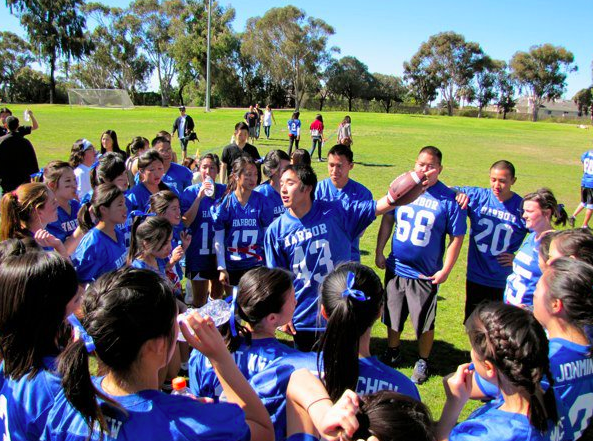In preparation for this blog post, I played in my first ever game of football. I’ve participated in the mandatory football exercises we did during P.E, but even then I had never played a full game. My church organizes football games every Saturday, but I’ve only ever gone to watch. Knowing that I had to engage with my sport for this class pushed me to finally accept the invitation to play.
One of the first things I noticed as I nervously joined my team on the field was how much communication goes on before the game even begins. As a spectator I never took much notice of that. When football games are aired on TV, most of the time is dedicated to showing game-play. Even when you see a shot of the huddle, as a spectator you don’t get to hear what’s going on. I had never experienced this part of the game, but I soon learned it was hugely important. I’ll admit that I struggled to keep up with what my team was talking about, but at the very least I understood my role.
During the course of the game, I tried to take note of my surroundings as much as possible, but I found it difficult to think about anything but the game. During plays, my teammates and myself were all extremely concentrated. I didn’t notice the people cheering us on at all, which is what I would normally be doing. But once we stopped playing, everyone returned to their usual selves. I find this particularly interesting when applied to professional football leagues. Football players have become heroes for many people in our culture, children and adults alike. Experiencing how different my teammates’ and even my own demeanor was during gameplay opened my eyes to how different these NFL players are as well. When we see them on the field they’re totally different people. I think it’s important for fans to realize that the champions they see on the field may not always be the all-around heroes that they conceive them to be. Obviously this varies from player to player, but it’s still beneficial to be cautious of whom we put on a pedestal.
Each week that I returned to play I felt more and more connected to my teammates. Like I mentioned at the offset of this class, I’ve never been in a sports-team before. It was a great experience to be on the inside of that huddle rather than watching from the sidelines. I started to take note of things that I hadn’t ever considered before such as the importance of knowing each player’s number, and how yesterday’s weather would affect the field today.
Overall, by engaging in football games I was able to understand why football players sometimes act the way they do. As a spectator watching from the comfort of your own home with nothing riding on the game, it’s easy to question why on Earth a player would get so infuriated over a call that he didn’t agree with. However, once I myself was playing and trying not to let my team down, I got it. Being a part of the team and the game intensifies all of your emotions. I got extremely frustrated when we lost, but the feeling of finally winning (after a three-game losing streak, mind you) was indescribable. I feel that my perspective as a spectator, whether in-person or at home watching televised games, has forever been altered. I have a newfound understanding of the game from the perspective of a player.

My team, Harbor’s House

I’m so glad that you are getting in the game! Being engaged bodily in sport does open up new aspects of the practice, as you so clearly noticed. Your observations about attention and emotion are really interesting. I wonder what you notice about the connection between the two. How does the intense concentration required to stay in the game and in the moment relate to the emotional investment you feel during and after the game? How does that attention relate to the connection you feel with your teammates?
I also find your observations about how people are on the field as different than how they are off the field extremely interesting. I’ve experienced this in my own sporting experiences, and read interesting accounts in football (I’m thinking of the time I read Friday Night Lights). Heroes on the field do not necessarily make heroes in life.
Congrats on your first win! I hope more are to come!